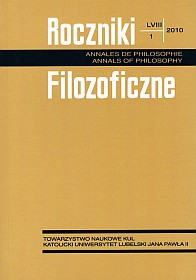Remarks on the System of Formal Logic Construed for Informal Logicians
Abstract
D. Sherry’s main theses included in his essay entitled “Formal Logic for Informal Logicians” are presented in the article. In a discussion with his theses it is shown that he prefers this kind of logic that has a lot of elements that are the same as in Aristotle’s logic understood as the art of thinking and the technique of discussion taken from Topics, and not the logic that was started in his Prior Analytics. It is also shown that not only patterns of inferring, but also the theses of logic, as well as theses to which no patterns correspond, that are guarantee reliability of inference patterns, may be intuitively obvious. In the article also attention is drawn to the fact that the PL- system of logic presented by Sherry was characterized by him by means of a rather poor logical terminology. In the American author’s argument there are no clear distinctions between the thesis of logic, the logical inference pattern and the rule of the procedure of proving. However, it can be established that the PL- system is constituted by argumentation patterns that are reliable owing to such theses of propositional logic as modus potens, modus tollens, disjunctive syllogism, conjunctive syllogism, complex destructive dilemma, and the two rules concerning creating proofs, i.e. the rule of conditional proof and the rule of reduction to the absurd. In the PL- system there are fewer theses than in the classical propositional calculus, but this has nothing in common with the so-called multivalent logics to which some theses of classical logic supposedly do not apply.
Everything suggests that some systems of non-classical logic systems may be built on the PL- system; namely, the ones in which theses are given that govern the correct use of non-extensional operators connected with key terms appearing in many sciences, like e.g. “time”, “change”, “causality”. Sherry’s essay reveals that he is a supporter of the thesis that knowledge of formal logic is necessary for using informal logic efficiently, which is necessary for teaching logic properly.
References
Bocheński J.M.: Logika i ontologia, [w:] Logika i filozofia, red. J. Parys, Warszawa 1993, s. 106-132.
Borkowski L.: Wprowadzenie do logiki i teorii mnogości, Lublin 1991.
Easwaran K.: The Role of Axioms in Mathematics, „Erkenntnis” 68 (2008), nr 3, s. 381-391.
Hughes G.E., Cresswell M. J.: An Introduction to Modal Logic, London 1974.
Kiczuk S.: Logika współczesna a matematyka i filozofia, „Roczniki Filozoficzne” 56 (2008), nr 2, s. 131-150.
Kraszewski Z.: Logika – nauka rozumowania, Warszawa 1975.
Lechniak M.: Interpretacje wartości matryc logik wielowartościowych, Lublin 1999.
Łukasiewicz J.: O intuicjonistycznym rachunku zdań, [w:] Z zagadnień logiki i filozofii, red. J. Słupecki, Warszawa 1961, s. 261-273.
Quine W.V.O.: Filozofia logiki, tłum. H. Mortimer, Warszawa 1977.
Sherry D.: Formal Logic for Informal Logicians, „Informal Logic” 26 (2006), nr 2, s. 199-220.
Sobociński B.: In Memoriam Jan Łukasiewicz, „Philosophical Studies” 6 (1956), s. 3-49.
Copyright (c) 2010 Roczniki Filozoficzne

This work is licensed under a Creative Commons Attribution-NonCommercial-NoDerivatives 4.0 International License.





